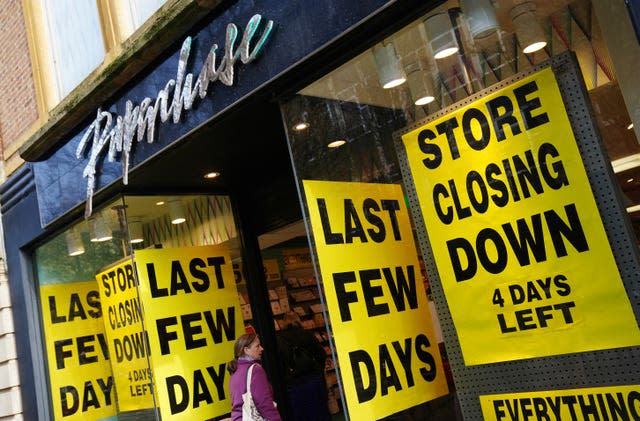More big firms are likely to go bust next year amid the “double whammy” of high borrowing costs and pressure on consumer budgets, according to insolvency experts.
Administrators and restructuring specialists also warned the PA news agency that high-growth companies such as tech firms could be among those facing financial turbulence.
It comes after another year of tough economic conditions resulted in increased business failures during the year.
Official figures from the Insolvency Service earlier this month showed the total of company failures over the first 11 months of 2023 was more than reported during the entirety of 2022.
PwC’s head of insolvency David Kelly said both the construction sector and business services industries each saw almost a fifth of total insolvencies.
He said he therefore expects these areas to “remain the hardest hit in 2024”.
Hospitality and retail have also contributed to business failures as they have been impacted by higher energy prices, pressure on consumer finances and borrowing costs.
Around 17% of all insolvencies have come from the hospitality sector and 14% have come from retailers.
This included high-profile failures such as the administration of Wilko, which had operated 400 shops and employed more than 12,000 workers.
Paperchase, Planet Organic and Le Pain Quotidien were also among those to enter insolvency during 2023.
Rob Hornby, partner and managing director of AlixPartners, said he expects company insolvencies to continue apace in 2024.
“We are expecting next year to be a big year for insolvency,” he said.
“That is likely to be across the board, both in terms of geographies and sectors.”
The director at the restructuring and advisory specialist said typically high-growth areas, such as technology, could see turbulence as financing comes under increased pressure.
Mr Hornby said: “I personally think we are definitely seeing an element of the dotcom bubble repeating itself.
“Since before the pandemic, there was plenty of investment money around, with VCs (venture capitals) worried about missing out.
“You ended up with some areas of tech, for example, where you had more competitors funded in one space than were ever likely to succeed sustainably in the longer term.
“Now some of that funding is running dry, you will start to see consequences.”
Mr Hornby and Richard Fleming, managing director and head of restructuring for Europe, at Alvarez & Marsal, both said they expected more firms to use restructuring plans this year in an effort to avoid full administrations.
Nevertheless, Mr Fleming said there was potential for some large failures next year as those with large debt burdens face particular pressure due high interest rates.
“We are expecting a similar level of insolvencies overall in 2024, but we should see an increased number of larger cases,” he said.
“The impact of higher interest rates will increasingly be felt by companies who need to service their debt and by households on their mortgage payments.
“Therefore, we’re expecting a double-whammy impact on companies across the UK, with a slowdown in consumer demand and higher borrowing costs, all putting stress on margins.”




